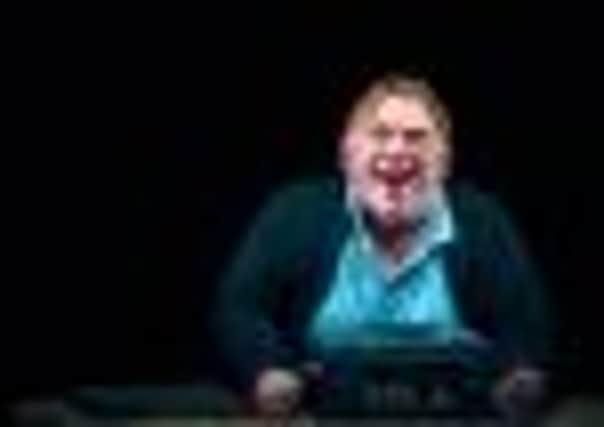Theatre reviews: Krapp’s Last Tape/Footfalls | The Brother’s Keeper | Little Shop of Horrors


In truth, though, there’s absolutely nothing small, or incapable of commanding the big space, about the two mighty Samuel Beckett fragments currently playing as a double bill at the Citizens’ Theatre. Despite their extreme austerity and restraint, and their simple framing of a single human figure against a dense field of darkness, these plays are brave, beautiful and masterly theatrical poems about the brief pain and joy of human life, born of the high modernist age in which Beckett wrote, but so perfectly sculpted that they seem timeless. Dominic Hill’s superb Citizens’ production – the last in his acclaimed first season as artistic director – shapes them into one of those rare theatrical events that will leave no-one who sees it completely unchanged.
So in the great 55-minute monologue Krapp’s Last Tape, a shambling yet immensely charismatic Gerard Murphy takes to the stage as Krapp, a solitary man in his late sixties who, throughout his life, has made a habit of recording a tape on his birthday. Clattering and banging painfully around the dark outer reaches of his room, Krapp gradually puts together his ancient reel-to-reel tape recorder, and the tape he wants to hear before he records this year’s offering. It’s the one from 30 years before, when he was a “young fool” of 39; the year when his mother died, and when he broke up – for reasons he can no longer recall – with a woman he seems to have loved.
Advertisement
Hide AdThe play is essentially a duet for two versions of the same voice. There’s the younger, more arrogant, more pretentious Krapp; and the one we see before us, not far from death, often disgusted by his own youthful foolishnes, but still wryly humorous enough to reduce the audience to helpless laughter with the acid wit of his self-mockery. And in Gerard Murphy, this great play finds a near-perfect voice and stage presence, full of that dark relish for language, and for the absurdity of life, that is – for all of us – part of our essential human armoury against the dying of the light.


And if this version of Krapp’s Last Tape is an almost flawless theatrical experience, it is equalled by the shuddering power of Hill’s staging of the 25-minute fragment Footfalls, a dialogue between a woman – or the wraith of a woman – who paces to and fro along the front of the stage, and the voice of her unseen aged mother, which haunts her every step. Swathed in a sheath of silver-grey rags and in her own long hair, magnificently lit by Lizzie Powell, Kathryn Howden creates an unforgettable figure of human pain and isolation, without end; while Kay Gallie is magnificent as the voice of the mother, who somehow seems both the absolute source of her daughter’s pain, and the one person in or out of the world who cares enough to wish for its end.
Over at Oran Mor the final play in this spring’s Play, Pie and Pint season offers a fine 45-minute Glasgow counterpoint to Beckett’s dark poetry of barrenness and loss. Peter MacDougall’s The Brother’s Keeper is the fourth in a quartet of Oran Mor plays by one of Scotland’s leading screenwriters, all structured around the story of the same bleak Glasgow family.
In this play, the four children of the family – including one daughter, the “keeper”, brillantly played by Barbara Rafferty – have reached late middle age, and are gathered for their estranged father’s funeral. MacDougall’s fine text, though, wastes no time on naturalism. Instead – in Paddy Cunneen’s superbly Beckettian production – it lines up these four black-clad Glasgow figures on a dark stage, and delves deep into a rich poetic reflection not only on the ways in which their emotional inheritance has blighted their lives, but also – with a tremendous, sharp streak of Glasgow humour – on how their accounts of their own lives, and their excuses for them, are themselves hopelessly and hilariously flawed.
If two short Beckett plays represent a bold choice for the main stage at the Citizens’, then John Durnin of Pitlochry Festival Theatre has also edged out on a limb, in deciding to launch the 2012 summer season with a production not of a familiar musical like last year’s My Fair Lady, but with the 1982 cult hit Little Shop Of Horrors. Written by Alan Menken and Howard Ashman, the show is a camply satirical off-Broadway musical, based on the 1960 Roger Corman film, about a shy young florist’s assistant in New York’s Skid Row whose life is transformed when he finds himself in charge of an increasingly huge flesh-eating plant; its aim, it seems, is to counter the anti-communist paranoia of 1950s and 1980s America with a parable about the all-devouring rapacity of American capitalism.
As in all Pitlochry musicals, the multitalented 11-strong cast wield musical instruments as well as singing, dancing, and acting. The Skid Row set – and the giant plant – are brilliantly realised, and there are some feisty performances from the women in the cast, led by the lovely and witty Kate Quennell as the heroine Audrey.
Advertisement
Hide AdIn the end, though, the show’s cultural and political references seem a shade obscure, the music forgettable, and the overall effect a tad ugly and depressing, to little purpose. No-one wants to see the Pitlochry season trapped in a repertoire of chocolate-box prettiness, but if John Durnin is looking for an escape route, this back-to-the-future lurch into slightly dated 1980s pastiche seems like something of a dead end.
Krapp’s Last Tape / Footfalls
Citizens’ Theatre, Glasgow
Rating: *****
The Brother’s Keeper
Oran Mor, Glasgow
Rating: ****
Little Shop Of Horrors
Pitlochry Festival Theatre
Rating: ***
• Krapp’s Last Tape / Footfalls and The Brother’s Keeper run until 9 June. Little Shop Of Horrors is in repertoire at Pitlochry Festival Theatre until 13 October.